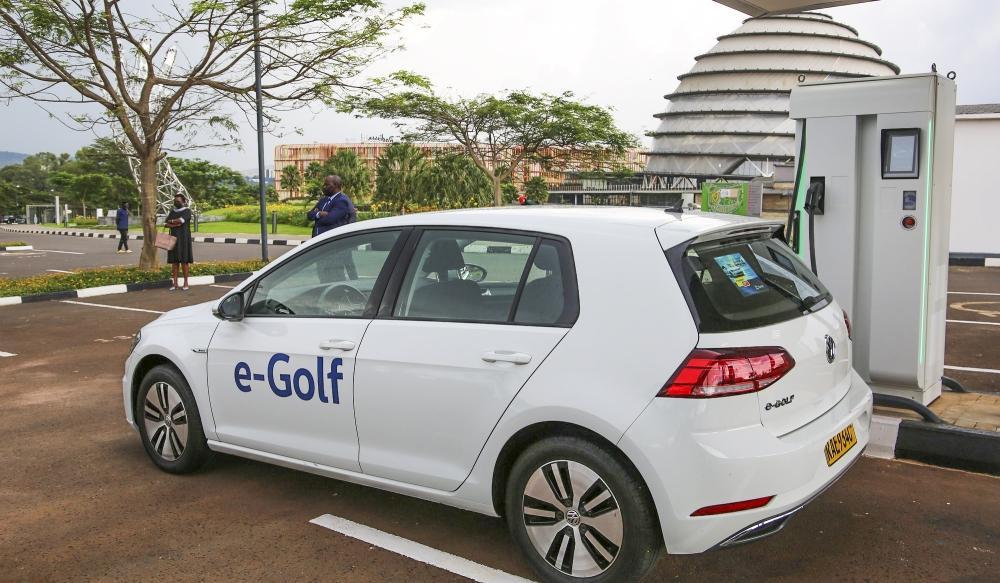Africa-Press – Rwanda. Rwanda is exploring the feasibility of Vehicle-to-Grid technology, which allows Electric Vehicles (EVs) to not only receive power from the grid for charging but also to send it back in case of need.
This bi-directional charging system treats these high-capacity batteries as tools to push and pull energy to and from connected vehicles based on the demand for electricity at any given time. This extra energy can be used to power houses, buildings, and ultimately anything connected to the power grid.
According to an official in the Ministry of Infrastructure (MININFRA), this move seeks to improve energy efficiency and preparedness for the increase of Electric Vehicles (EVs) in the country over the coming years.
As explained, the incentives provided to spur the increase of EVs in the country “will require us to be prepared” to accommodate the energy demand. “That’s why we are exploring this technology that would help us attain such energy efficiency for the use of EVs and other consumption areas. This would stabilize the grid and be cost-saving for EV owners,” the official said.
Rwanda’s electricity connectivity rate stood at 82 percent in 2024, and the total power generation surpassed 1.4 million MWh in the same year. The government provides subsidized electricity tariffs at industrial rates (approximately $0.10/kWh) for the EV ecosystem.
According to Rwanda Energy Group (REG), the country is prepared to meet rising electricity demand, including the boom in EV adoption, thanks to current capacity, reserves, and projects like the 43MW Nyabarongo II plant, ensuring a reliable power supply through ongoing expansion efforts.
Nicholas Hu, the Co-founder of Kabisa, a Rwandan-based electric mobility company, said that while V2G is technically viable, it is not yet economically or operationally justifiable for grid-connected areas in Rwanda.
“The grid is relatively stable and expanding, with ongoing investments in hydro, solar, and methane power. EV adoption, especially of four-wheelers, is still at early stages and not yet sufficient to support energy return to the grid. Investing in utility-scale renewables and hybrid charging solutions yields much higher returns than vehicle-based grid buffering.”
However, he noted, there is a unique opportunity for V2G in rural areas which not yet connected to the national grid but served by microgrids, where EVs can act as mobile energy storage units that stabilize or extend local energy availability, particularly for health posts, schools, or agricultural processing hubs.
As the country continues to invest in boosting the EV ecosystem with incentives but also developing the necessary infrastructure, following the mapping of over 224 potential sites for EV charging infrastructure, the official from MININFRA said the government will start building about 36 charging stations as it waits for private sector partnership to construct more.
The master plan focuses on high-density and high-traffic areas, leveraging existing petrol stations and commercial buildings to expedite implementation, with focus on increasing such infrastructure upcountry to ensure that no car travels more than 50 kilometres without coming across a charging station.
Data from Rwanda Revenue Authority (RRA) shows that of the 7,172 hybrid and electric cars that were imported into Rwanda between 2020 and 2024, only 512, or slightly over 7 per cent were electric, while 6,660 (shipped into the country since 2021), or more than 92.8 per cent, were hybrid.
Rwanda revised its tax policy on hybrid vehicles, which included reintroducing an 18 per cent VAT on hybrid vehicles, which had been exempt since 2021. This was justified by the Ministry of Finance showing concerns over the aging fleet of imported hybrids, which undermines environmental protection efforts.
However, electric vehicles are still VAT-exempt.
For More News And Analysis About Rwanda Follow Africa-Press






